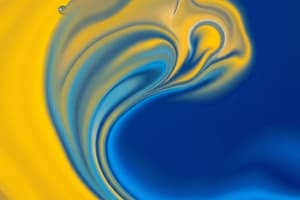Podcast
Questions and Answers
Which of the following best defines a fluid?
Which of the following best defines a fluid?
- A specific type of gas
- A solid that can change its form
- A substance that has a fixed shape
- A material that can flow and take the shape of its container (correct)
All fluids are incompressible.
All fluids are incompressible.
False (B)
What is an example of a fluid?
What is an example of a fluid?
Water
In physics, both liquids and _____ are considered fluids.
In physics, both liquids and _____ are considered fluids.
Match the following properties to their correct types of fluids:
Match the following properties to their correct types of fluids:
Flashcards
What is fluid?
What is fluid?
A substance that can flow and takes the shape of its container.
Fluid characteristic
Fluid characteristic
A substance that has no fixed shape and can be poured.
Examples of Fluids
Examples of Fluids
Water, oil, air are examples of fluids, which can flow.
Fluid Properties
Fluid Properties
Signup and view all the flashcards
Fluid State
Fluid State
Signup and view all the flashcards
Study Notes
Properties of Fluids
- Fluids are substances that can flow, which means they can change shape continuously under an applied shear stress.
- This includes liquids and gases.
- Liquids have a definite volume, whereas gases do not.
- Fluids resist deformation, a property known as viscosity.
- Viscosity is a measure of the internal friction within a fluid.
- Higher viscosity indicates greater resistance to flow.
- Fluids also exhibit pressure, which is force per unit area.
- Pressure is exerted equally in all directions within a confined fluid.
- Fluids transmit pressure equally in all directions, a principle known as Pascal's Law.
- Fluids also exhibit buoyancy, which is the upward force exerted by a fluid on an object immersed in it.
- Buoyancy is determined by the weight of the displaced fluid.
Types of Fluids
- Newtonian fluids: Viscosity remains constant regardless of the applied shear stress. Water and air are examples.
- Non-Newtonian fluids: Viscosity changes with the applied shear stress. Examples include blood, paint, and some types of food.
Fluid Dynamics
- Fluid dynamics is the study of fluids in motion.
- It is a complex area of study involving many factors, including:
- Velocity fields: Describing the speed and direction of fluid motion at different points in space.
- Pressure fields: Describing the pressure exerted by the fluid at different points in space.
- Density: A measure of the mass per unit volume of the fluid.
- Viscosity: Resistance of the fluid to flow, described earlier.
Fluid Statics
- Fluid statics is the study of fluids at rest.
- Key concepts include:
- Pressure variation with depth: Pressure increases with depth in a static fluid due to the weight of the fluid above.
- Buoyancy: The upward force exerted by a fluid on an object immersed in it, determined by the weight of displaced fluid. An object will float if the buoyant force equals or exceeds the object's weight.
- Archimedes' Principle: The buoyant force on an object submerged in a fluid is equal to the weight of the fluid displaced by the object.
Fluid Mechanics Applications
- Fluid mechanics has numerous applications in various fields.
- Engineering:
- Designing pipelines, pumps, and turbines.
- Analyzing aerodynamic forces on aircraft and automobiles.
- Meteorology: Understanding atmospheric phenomena and weather patterns.
- Oceanography: Studying ocean currents and waves.
- Medicine: Blood flow analysis, designing artificial organs, and understanding the effects of fluids inside the human body.
- Environmental science: Modeling water flow in rivers and lakes as well as pollution dispersal.
- Engineering:
Studying That Suits You
Use AI to generate personalized quizzes and flashcards to suit your learning preferences.




